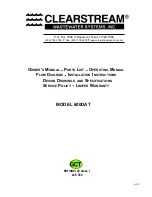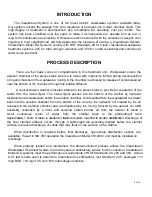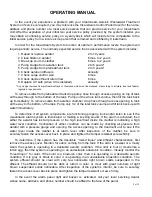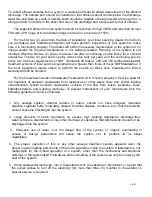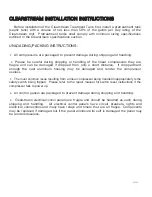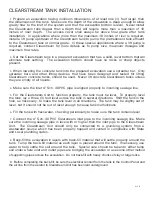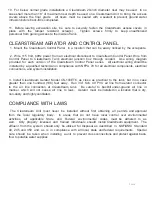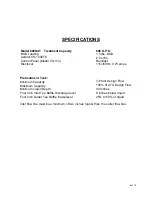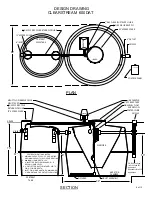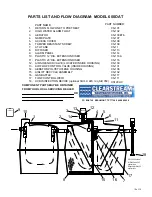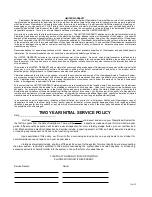
CLEARSTREAM TANK INSTALLATION
1.
Prepare an excavation having minimum dimensions of at least one (1) foot larger than
the dimensions of the tank. Make sure the depth of the excavation is deep enough to
allow
gravity flow to the inlet of the system and that the excavation bottom is level. Never
install
the Clearstream tank deeper than a depth that will require more than a maximum
of 18
inches of riser depth. The access cover shall always be above final grade after tank
installation. In applications where more than the maximum 18 inches of riser is required,
install a lift pump upstream of the Clearstream tank to pump the pretreatment tank effluent
to the Clearstream tank at normal grade. In these special applications where a lift pump
is
required, contact Clearstream for more details as to pump size, maximum dosages and
maximum flow rates.
2.
Set the Clearstream tank in a prepared excavation that has a solid, level bottom that
will
eliminate tank settling. The excavation bottom should have no rocks or sharp objects
present.
3.
When lowering the concrete tank into the prepared excavation use a spreader bar. Only
spreader bars and other lifting devices, that have been designed and tested for lifting
Clearstream concrete tanks, should be used. Never lift concrete Clearstream tanks unless
they are empty of all liquids.
4.
Make sure the inlet 4” Sch. 40 PVC pipe is aligned properly to incoming sewage line.
5.
For the Clearstream Unit to function properly, the tank must be level. To properly level
the tank, lay a three (3) foot level across the tank in several directions. Shift the tank in
the
hole, as necessary, to make the tank level in all directions. The tank may be slightly
out of
level, but it should not be out of level enough to cause tank malfunctions.
6.
Fill the tank with
fresh
water, checking periodically to make sure the tank remains level.
7.
Connect the 4” Sch. 40 PVC Clearstream inlet pipe to the incoming sewage line. Make
sure the incoming sewage pipe is level with or higher than the inlet pipe to the Clearstream
Unit. The Clearstream Unit should only be connected to a plumbing system from a
wastewater source which has been properly trapped and vented in compliance with State
and Local plumbing codes.
8.
Back-fill the excavation in layers with back-fill material that will settle properly around
the
tank. Tamp the back-fill material as each layer is placed around the tank. If
necessary,
use
water to help settle the soil around the tank. Special care should be taken
to either
tamp
soil under where inlet and outlet pipes are bridging the excavation or use
some other
method
of supporting pipes across the excavation. Do not back-fill with heavy chunks of clay or large rocks.
9. Before completing the back-fill, be sure the electrical conduit from the tank to the Control Panel and
the air line from the aerator to Clearstream Unit has been laid underground.
6
of
1
2

